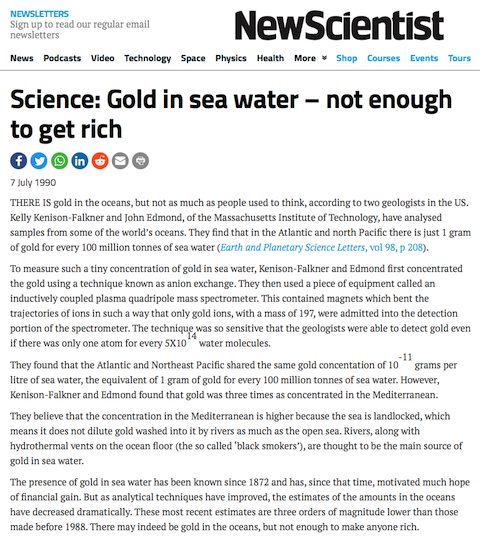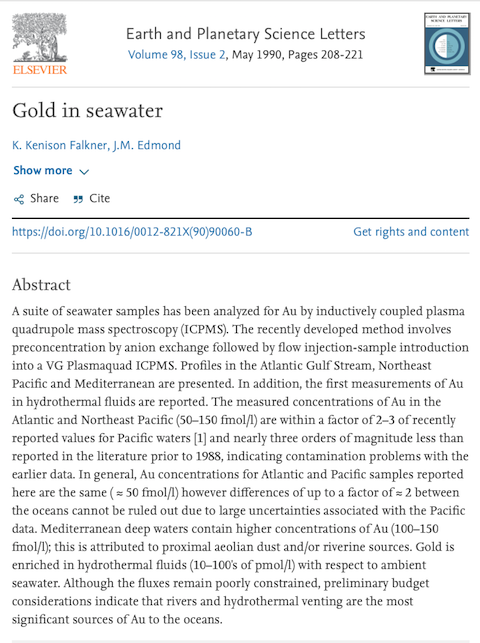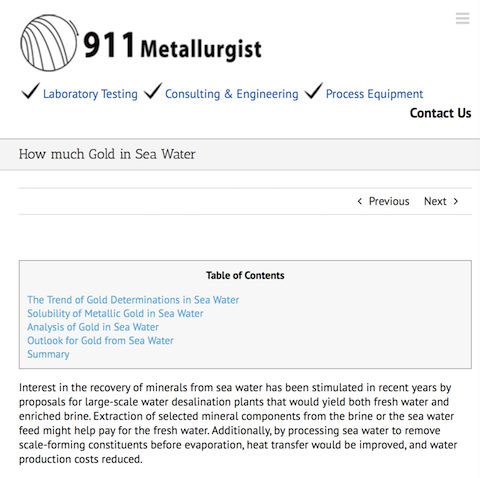
-----
Extract Gold from Seawater Q&A
! Atomically coupled gold is available in Ocean Water. Alkaline chemistry allows us to separate chloride bonded metals and render them as a condensate. This mineral condensate can be removed from the solution through dehydration or simply through filtration, something that cannot be accomplished when these materials are coupled to chlorine atoms.
Once the condensate is dehydrated into a powder, rendering these materials into an acidic solution will allow for the removal of the macro materials, such as zinc, magnesium and calcium. Once the Mg, Zn and Ca are removed, the solution is once again basified, or alkalized. This will allow for the rhodium, gold, ruthenium, osmium, and other platinum group elements to untether from the chlorine. Once this secondary condensate is dehydrated, it can be plasma coupled back into a diatomic bond.
This will render these materials into a metallic form, allowing them to be assayed using standardized systems and equipment.
For those here quoting "experts", please look into the work done by physicist Dr. Josef Tyls as well as Dr. John Milewski. Both of these people have pulled pure gold from beer bottle glass, using microwave fusion technology.
Kevin Hay
- Sooke, British Columbia
March 15, 2021
Q. Kevin, what do you mean by plasma coupled? How do you bring the powder to metallic?
Gary DunnHobbyists - Browns Town St.Ann, Jamaica
May 31, 2022
⇩ Related postings, oldest first ⇩
Q. I have read in an old encyclopedia that gold is suspended in sea water. Do you have any information on this, and also, what type of state the gold would be in ...?
Richard Smith- Dallas, Texas
2000
A. Gold is found in sea water in the form of gold chloride, and the concentration range varies but is about 6 parts per trillion. This means that in a cube of sea water that is 1 kilometer deep, 1 kilometer wide, and 1 kilometer in length, there would exist 6 kilograms of pure gold. The efforts required to extract this gold would far out weigh the value of the gold.
Nikki Studer- Christchurch, New Zealand
2002
Where is the gold
Q. My question is about extracting gold from salt water. You said that the gold is bonded to chloride, so if you evaporate a glass of sea saltwater THE gold would stay with the salt and not evaporate with the distilled water. That also means that there is gold in the sand as well. Is that true?
Mikael Lewcunchemistry student - BORÅS, Västra Götaland, SWEDEN
2003
A. If you were to evaporate a glass of seawater the gold may or may not remain, depending on may of the conditions inherent to evaporation some dissolved compounds evaporate with the water including salt. Besides the majority of the salt in which you are left with when evaporating seawater is not chloride but rather halide (NaCl). This is partially the reason why gold can also be found in fresh water and even rain. However the concentration of gold in those conditions is so much less than that found in the sea that it is almost impossible to scientifically detect. We know it is there due to the law of constant proportions which state that all elements are found in all forms of water in equal proportions. So say that if the ratio salt to gold in normal seawater was 1000/100 and you were to reduce the amount of salt to 1 (similar to fresh water) the amount of gold also would be reduced to 0.1 . As for more information on gold in seawater good resources to find out more can be found here: www.goldfever.com/gold_sea.htm or the scientific community's definitive paper on this topic is: Falkner K.Kenison, Edmond J.M. "Gold in seawater" Earth and Planetary Science letters, vol 98 (May 1990) pg 208-221
Hope this helps
- Durham, New Hampshire
2004
Q. I understand that the amount of gold in seawater is infinitesimal.
I just watched a Discovery Channel program on gold mines. They mine ore in open pits. It takes 40 tons of ore to yield an ounce of gold.
But it got me thinking. How much gold is there in garbage in landfills?
- Chicago, Illinois, USA
2007
A. Forget seawater. Instead, use ancient sea salt deposits.
The gold is locked up in the matrix as chelates and complexed materials, which are not readily assayable. I've personally recovered up to 8 grams/50 lb bag. It's not so complicated as the "Gold from Salt Report" from goldmineworld.net would indicate, although it did take me several years of research/trial-and-error to understand the chemistry and accomplish the task.
Precious Metals Extraction - Forest Lake, Minnesota USA
May 23, 2010
Ed. note: "Howard Wesley" has used multiple names on his submissions to this site so we would presume that all of them are equally fictitious :-)
Q. Howard. I may have some salty material that may have some of this "nano gold". Been looking for an expert in this field. Can you let me know how to extract this?
Thanks and let me know.
- SLC, Utah
December 25, 2012
Q, A, or Comment on THIS thread -or- Start a NEW Thread


